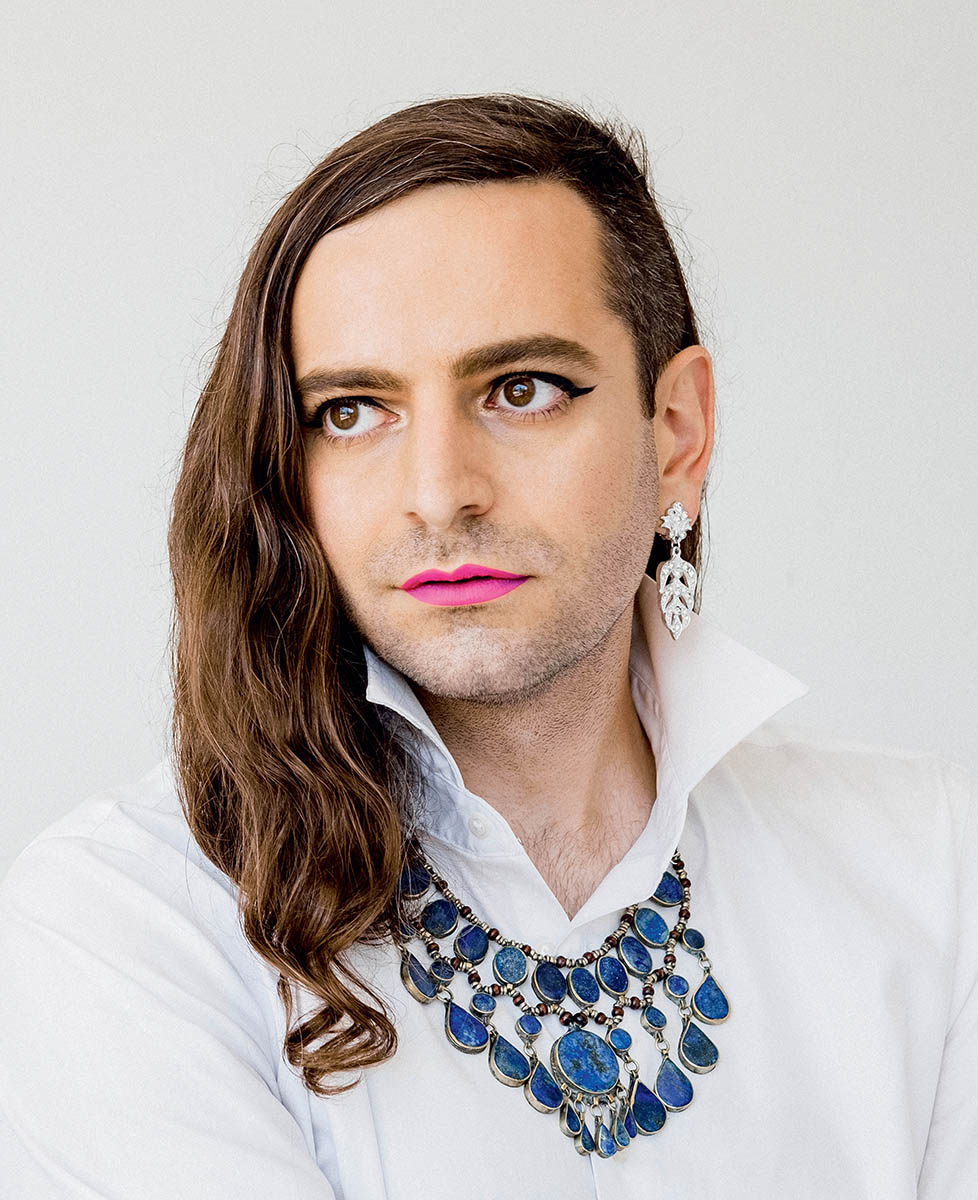

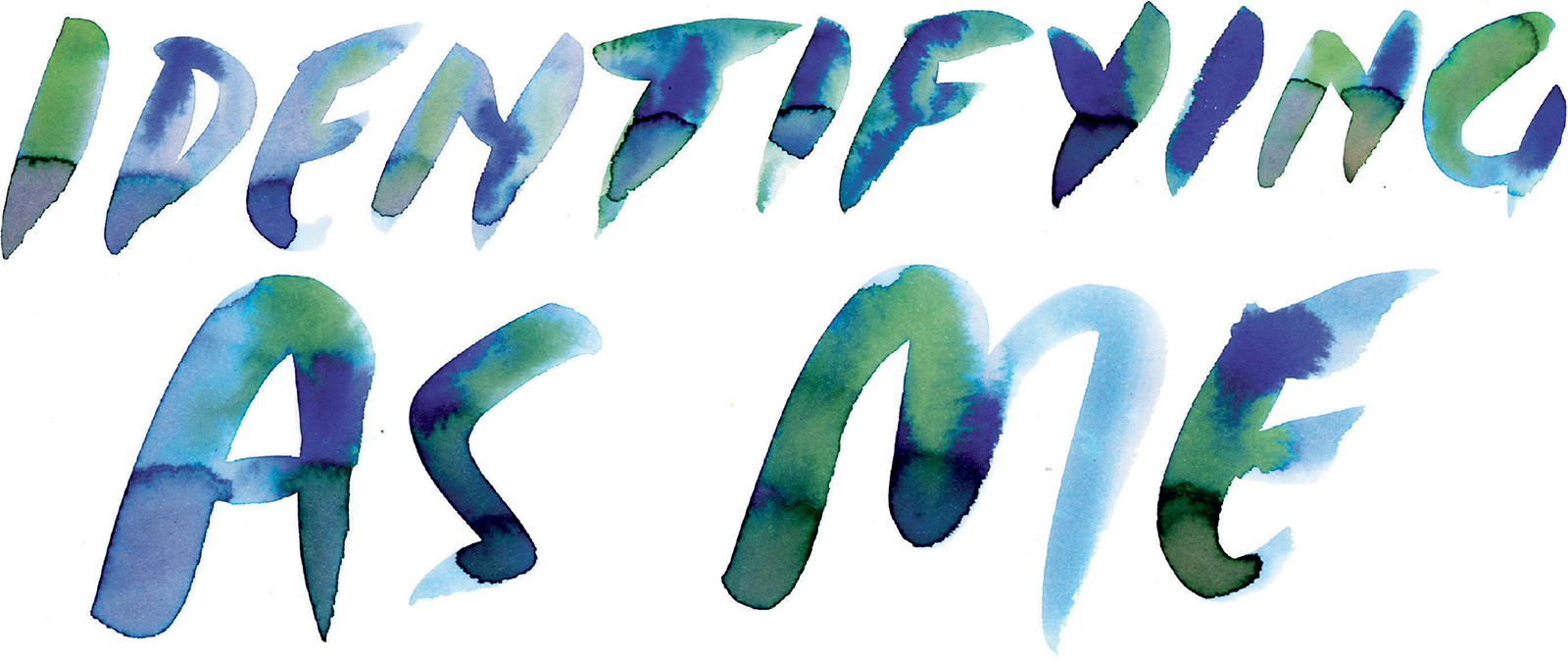
Activist and writer Jacob Tobia talks to comic, actor, and producer Rhea Butcher about how gender and gender identity connect to life on and off stage.
Photography by Oriana Koren
Lettering by Samantha Hahn
When famed lesbian comic Rhea Butcher decided it was time to publicly disclose their non-binary identity, they did so the way any self-respecting comedian would: via a chain of tweets. It started in January—“I’m non-binary but I identify WITH women”—revved up in February—“If you think it’s like all chill to be non-binary/lesbian these days, watch me walk past a high school alone”—and continued through March—“FYI I use they/them/their pronouns now.”
From the get-go, Butcher’s non-binary coming out didn’t play by the rules of a typical celebrity “coming-out moment.” There were a few headlines and blog items covering the news, but there certainly wasn’t a press release or publicity tour. In Butcher’s own (tweeted) words, “I held off having some ‘press release’ style thing because A. I didn’t want to because I want the attention to be on comedy, my work, etc. and B. People can be needlessly cruel.”
Emblazoned with the disclaimer “No publicists were involved in the making of this gender,” their coming-out moment was less of a moment and more of an incremental unfurling. What their public disclosure lacked in drama and noise, it made up for in grace. Too gradual about the whole thing to really make a splash, a splash wasn’t what they were going for in the first place. Instead, Butcher opted for a series of gradual ripples, a stone skittering across the surface of the water before gently gliding in.
And isn’t this what coming out should be, anyway? Isn’t this what non-binary people deserve? The opportunity to simply glide into our gender, to effortlessly own it, to arrive at a place of happiness and self-actualization, fanfare optional?
Six months into their unfurling, Rhea Butcher sat down with me, resident non-binary trans-femme cutie, to discuss the state of comedy, Ford F-150s, weird midwestern roots, and, of course, all things genderfabulous.
I’m so excited to have the chance to chat, because when I was living in New York there were visible non-binary people everywhere. And I feel like now that I’m in Los Angeles, there are still non-binary people everywhere, but I don’t find them as easily.
They’re hiding in their houses, because everybody’s hiding in their houses in Los Angeles.
We’re just in our cars and we’re passing each other on the freeway and we don’t see each other.
Yeah, exactly. Can I also just point out that “non-binary” sounds like, you know, “I don’t work in the bookbinding factory anymore”?
Like, “I don’t have any binding.”
“I’m not binding anything anymore.” I’m binding myself, but not material things.
Publicly using the language of “non-binary” is kind of new for you, right?
Kind of, yeah.
But is it privately new for you?
Like, new-ish. I mean, I always related to genderqueer, gender-nonconforming, and stuff like that. And butch. It’s all within the same family of terminology, right? It’s all contextual, and whatever you want it to mean is kinda what it means. So it is new for me in that—despite the amount of theory that I’ve gone through in my own life and taking women’s studies back when it was still called “women’s studies”—oh god, now I’m just aging myself. I’m saying “women’s studies” because I am three hundred years old.
You’re a dinosaur. You’re Ben Franklin.
Yeah, exactly. I took women’s studies and I also took queer theory classes, but that was in 2003 in Akron, Ohio. And the language even then was very different from what it is now. It’s all an evolution, and I sort of feel like it’s new to me but only because I just didn’t know the word non-binary back then.
For me, it isn’t “coming out of the closet,” necessarily; it’s just finding a new aspect of myself. There are many people who feel that they came out of the closet about being a non-binary person. But I feel like I came out of the closet as a lesbian, as a gay person, as a homosexual when I did. And that was the moment that I “came out of the closet” and I smashed it and got rid of it after that, you know?
Whereas now I feel like it’s just a new level or plateau or something. You’re on a path and you get to a high point and you look out and you go, “Oh, non-binary. That makes a lot of sense for me now.” That’s how I relate to my experience. It’s less of “I’ve thought this for a long time and now I’m telling all of you.” You know what I mean?
Yeah, I like to talk about my non-binary journey as an open archaeological dig where a bunch of tourists were walking by the whole time, looking in. And I’m not a very good archaeologist. I’ve broken a lot of things and fucked up a lot of priceless artifacts in the process.
Yes. Some teeth got pitched into the trash.
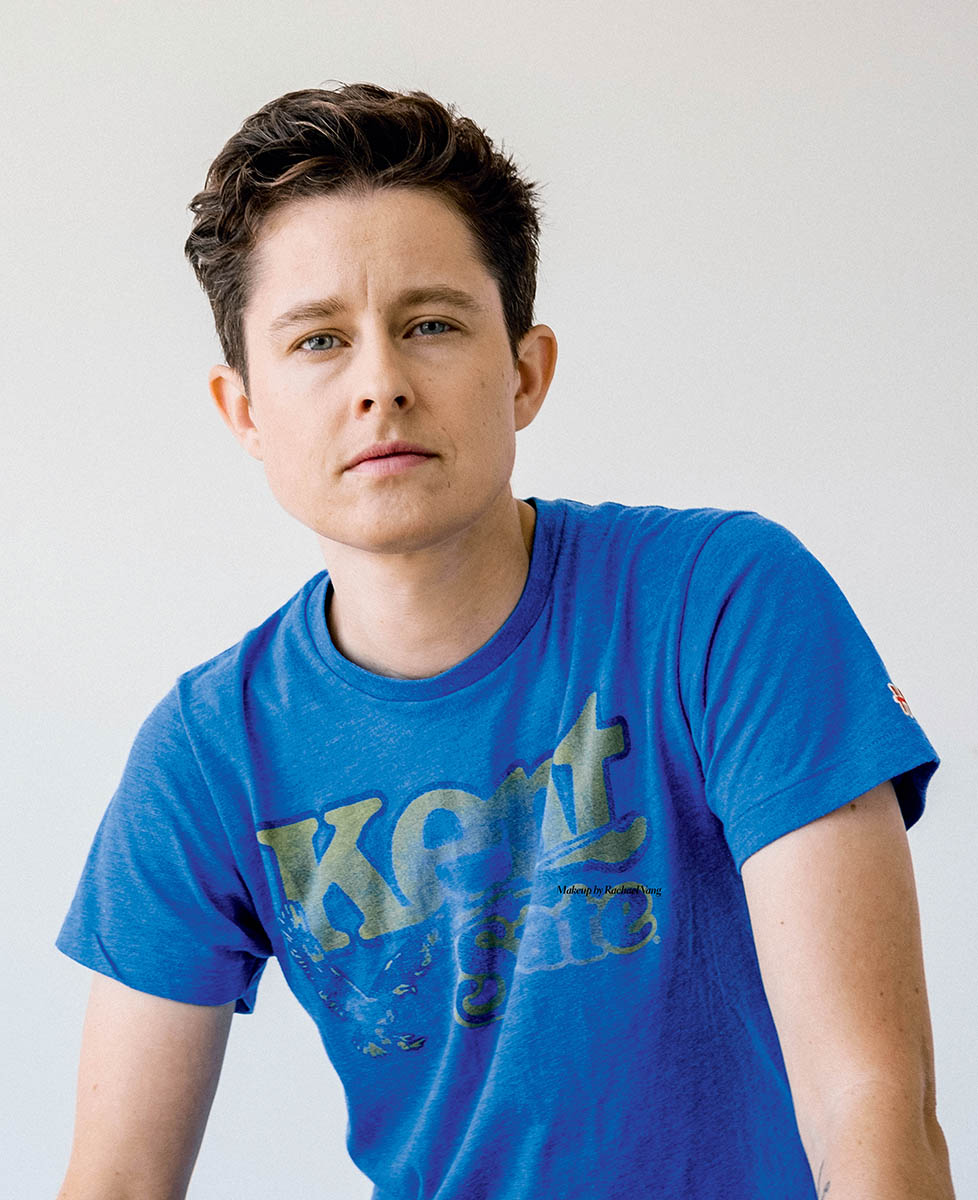
Makeup by Rachael Vang
When you were doing the disclosure process, talking about yourself as non-binary for the first time—
You mean my ingrate tweet storm?
Yes, your ingrate tweet storm, the veritable hurricane. You said you were apprehensive about what your comedy pal colleagues would say about it. What was behind that anxiety?
It’s mostly just the people that think pronouns are a joke. As a person who was following in the footsteps of other queer comedians—even specifically my wife, Cameron Esposito—just talking about “being gay” onstage, people would roll their eyes, like, “Oh, look at this social justice warrior . . .”
The reason I talk about this stuff is because that’s what my life is. I want to tell other comedians, “You’re talking about stuff that you think everybody relates to. It’s become neutral for you, so it’s totally fine. You don’t even see it as of your own experience anymore.”
I think that was my anxiety. I don’t necessarily want my comedy career to be like, “Oh, you’ve become *the* non-binary spokesperson!” I guess I’m fine with being the non-binary comic for now, but I don’t want that to be the only thing that people think of when they think of me. I also want them to think that I’m, I don’t know, smart and funny.
There’s no need for either of us to “speak for” the non-binary community.
Sure, yeah. When I’m speaking in a mainstream space, I’m happy to speak to it—but I don’t want it to be like, I’m the authority on this. I’m happy to be an authority when there is no one else non-binary in the room.
There’s this perception right now, and I don’t know exactly where it came from or how we got it, but there’s this perception out there that the moment you name yourself as non-binary, you’re all of a sudden fragile.
Yeah. That’s probably it, too. I’m just a snowflake now.
Like a delicate porcelain fucking vase.
Like, “Oh, I’m so sensitive ’cause I spent so much time like looking inward on these things . . .” You know what I mean?
Right. Right.
It’s like, “No, man, I fucking worked at the back of an oven, screen printing in Akron, Ohio, and I was thinking about these things.” You know?
Right. There’s this idea that non-binary people only exist on fucking Fifth Avenue and in Upper East Side apartments.
Just because a lot of queer people move to the coast looking for, I don’t want to say a better life, but maybe a slightly more accessible life, that’s not to say that you can’t have a good life, that you can’t survive and thrive, in other places. You can. I’ve been to those places in this country.
The thing is, we exist everywhere, it’s just that there’s a higher concentration of us in [cities like Los Angeles and New York] because there’s a higher concentration of people in these places. And then the attention goes to those places because they’re media centers. It’s like, “Where’s the megaphone?” Of course that’s where will get the most attention. But I lived in Akron, Ohio, much longer than I lived in Los Angeles.
So I think, also, there’s this weird perception that if you have the time to consider your gender identity or look into it at all, then you must be rich. You must have the time to do it. And it’s like, “No.” I know plenty of people who are non-binary and are not rich. Also, I am not rich. I don’t live in some high-rise. I drive the same car I left Ohio in.
Your “indulgent” gender identity makes people think that you must also have an indulgent lifestyle.
Of course. It’s so indulgent [insert eyeroll].
No, it’s actually just awareness. There are [non-binary] people that you’re running into every day that you don’t know are non-binary, ’cause they’re not walking around yelling it and you’re not paying that much attention. Which leads me to believe that it’s not that big of a deal. I mean, it is a big deal, but it’s also not that big of a deal. All you have to do is go, “Oh, that’s who you are? You’re non-binary? Great. Cool. Awesome, I’m into it.” That’s it. That’s all I’m asking for: that we interact with each other with the minimal amount of dignity where everybody can just go along with their day.
I find that when people are stressed about my gender identity, it’s because it’s affecting their perception of their own gender identity. If you fit into a binary, if you fit into the system that already exists and that works for you, great. I’m happy about it because you feel good. But me saying “This is who I am” shouldn’t affect you if you feel good where you’re at, you know?
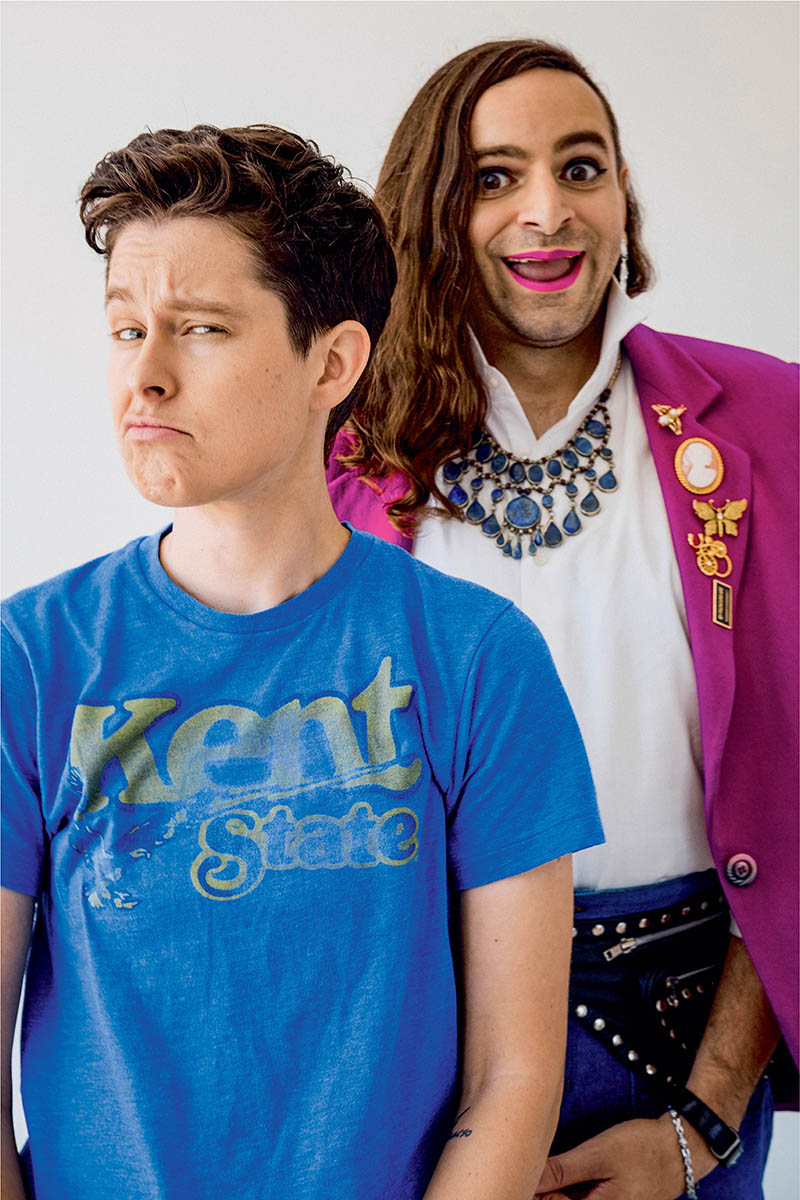
Right. We get each other.
We do.
And us uniting under the flag of non-binary doesn’t mean that we’re saying, “Oh, we are synonymous.” It’s us saying, “We are both invested in the same type of gender liberation.”
Absolutely. Yes.
And our needs are different. But that’s okay.
It is okay. Because I appreciate the needs that you have, and you appreciate the needs that I have. And so when someone is saying, “You know, I don’t care about Jacob’s needs, I only care about your needs,” I will say, “I don’t wanna work with you.”
That’s how that works. You just go like, “My needs are intertwined with my colleagues’ needs and my community’s needs. So if your concern is only about this one group, then we’re gonna need to have a longer conversation. Because I am fighting for this group and they are fighting for me. So you have to take all of us. You can’t just take one.” I’m a big fan of kicking the door open and holding it open for other people to come in as opposed to being like, “Okay, I’ll get in first and then, in a couple of years, y’all will follow me in.” That’s just not how it works.
Do you have any fond reminiscences of your butch Akron days?
Sure, I mean all my Akron days were butch, that’s for sure. People called me a tomboy growing up and stuff like that. My grandfather was a teamster. My dad worked with sheet metal, so I was riding in hand-me-down Ford F-150s. I was shut out of most of the other [masculine] stuff. I got a little bit, like when I would drive the riding lawn mower around for fun. They would just start the thing up and put me on it. That was what I had as a toy to play with. It was the lawn mower.
And then my mom worked at JOANN Fabric.
Oh. My. God.
Like, my whole childhood was the most binary possible thing you can imagine. And my grandmother was super into quilting and stuff. At the time, I didn’t want to be part of the quilting/seamstress thing, and now I think, Man, I wish I would have learned that. It was internalized misogyny and, you know, disdain for femininity that made me say, “I don’t wanna quilt. No thanks.” And now I’m like, “Oh man, quilting is a skill.” Just a skill.
I think some of my anxiety [about coming out as non-binary] was that I felt like I was giving up my womanness, something I had spent many years coming to terms with. The fact that I was and am understood as a woman in this world. But coming out as non-binary doesn’t erase that from my life. It actually just makes me a fuller person: I’m identifying as the person I’ve always wanted to be. It helped me see that the fight for women’s rights can actually be benefited a lot by speaking in gender-neutral terms.
My vision is for you to one day take up quilting and make some really good Ford F-150–themed quilts.
Yeah, dude. Absolutely. That’s my dream. We can make this happen. gc
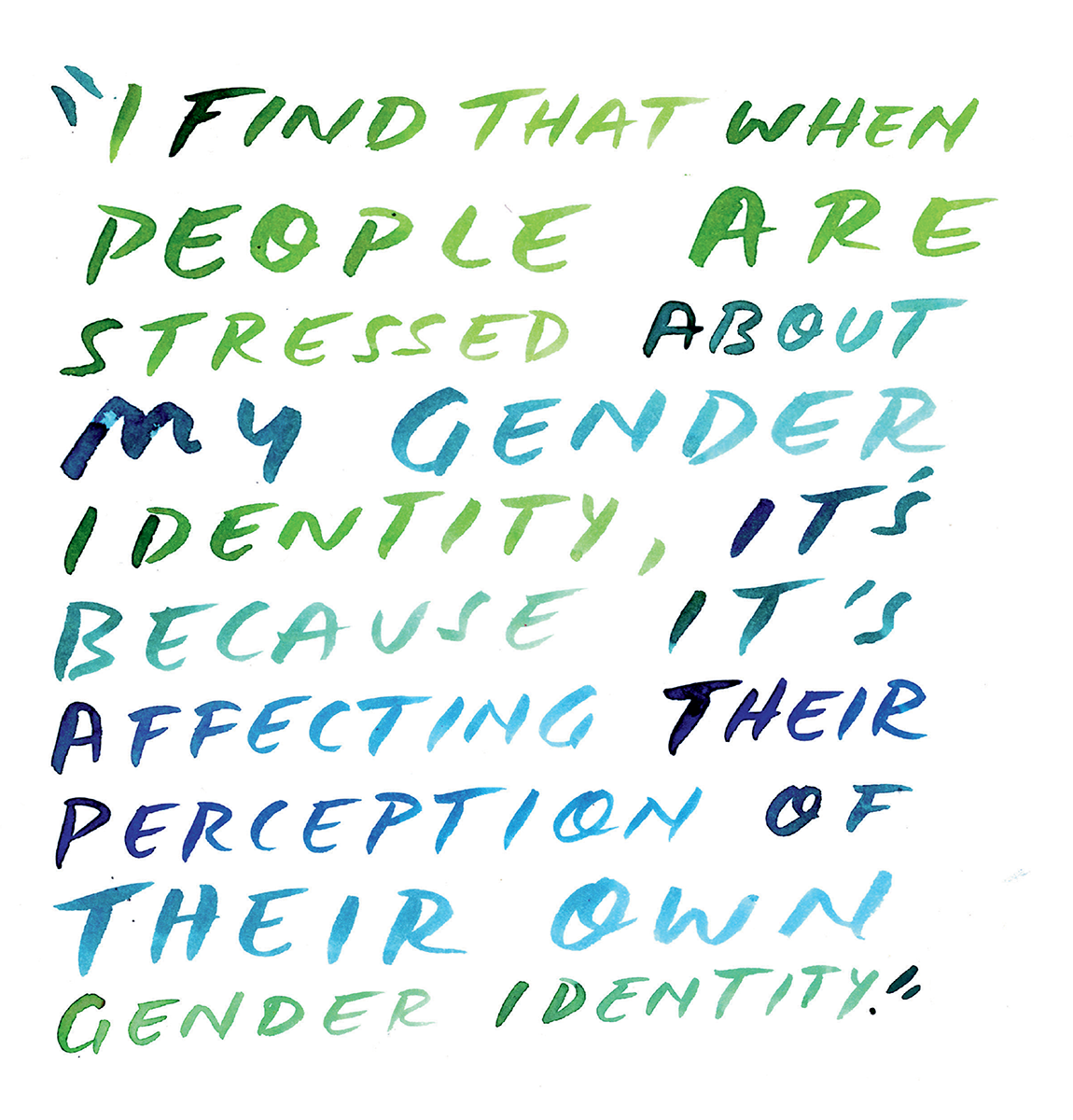
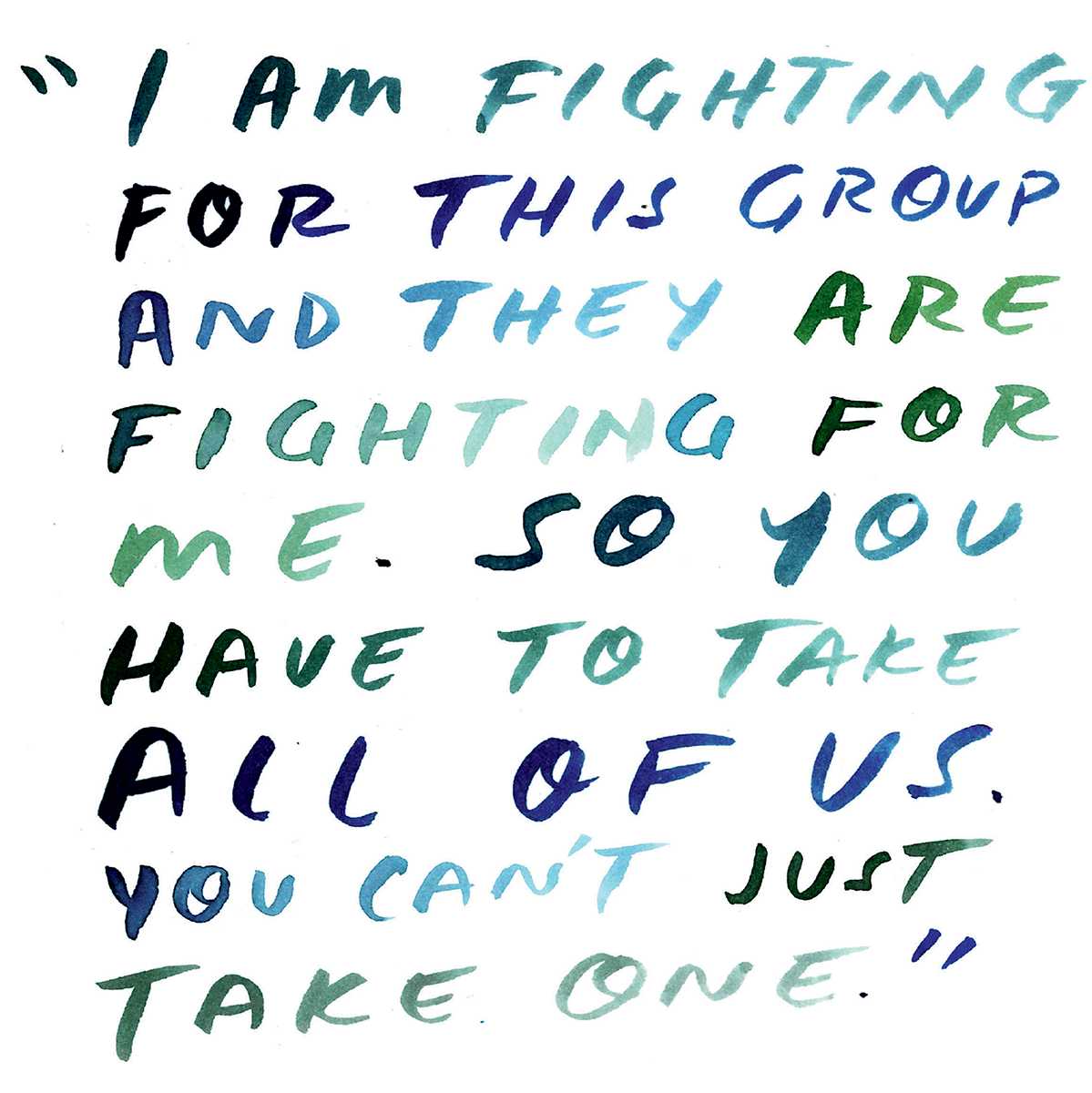
—Rhea Butcher
